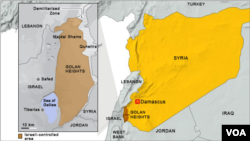A Syrian opposition spokesman said that 21 United Nations peacekeepers being held by Syrian rebels soon will be freed.
Hisham Marwah, a spokesman for the Western-backed Syrian National Coalition, made the comments in Istanbul amid mounting international pressure to free the peacekeepers.
"These people [the 21 U.N. peacekeepers] will be released soon because they are not involved in any military action or any military operations," said Marwah.
Rami Abdul-Rahman, a spokesman for the London-based Syria Observatory for Human Rights, said he and others have told the rebel brigade that holding the peacekeepers is a mistake.
The peacekeepers are part of 1,000-plus force that patrols a zone between Israel and Syria in the Golan Heights. The U.N. troops were detained Wednesday by Syrian rebels who have identified themselves as the Martyrs of Yarmouk.
The Observatory posted video on the Internet showing some of the Filipino peacekeepers. One peacekeeper, who identified himself as a captain, said he and his men were safe.
"Civilian people helped us for our safety and distributed us in different places to keep us safe. They gave us good accommodation and gave us food to eat and water to drink,'' said an unidentified UN peacekeeper.
Both the U.N. and the Philippines have strongly condemned the seizure of the peacekeepers. U.N. officials have been negotiating with the rebel brigade's commanders for their release.
The Syrian Observatory's Abdul-Rahman said the rebel group is fighting for villages in the area and has been operating independently.
“They want the Syrian regime to stop attacking the area, to stop shelling the area, for that he [the brigade commander] stopped the United Nations monitors,” said Abdul-Rahman.
One of the concerns of Western countries trying to support the Syrian opposition has been a lack of political and military cohesion among rebel forces.
Abdul-Rahman said the rebel brigade's actions in the Golan are part of a worrying trend.
“We see the Syrian regime, they do many crimes in Syria. But now we report every day crime of the Syrian opposition, as well,” said Abdul-Rahman.
Seeking to solidify its strategies, the main Syrian opposition organization, the Syrian National Council, said Thursday it will meet next Tuesday in Istanbul to begin talks on forming a provisional government.
Meanwhile, the medical charity Medecins Sans Frontiers [MSF] criticized the government of President Bashar al-Assad Thursday for attacking doctors and hospitals.
It also warned rebel groups not to use medical faculties for cover or humanitarian aid shipments to help smuggle in weapons.
Hisham Marwah, a spokesman for the Western-backed Syrian National Coalition, made the comments in Istanbul amid mounting international pressure to free the peacekeepers.
"These people [the 21 U.N. peacekeepers] will be released soon because they are not involved in any military action or any military operations," said Marwah.
Rami Abdul-Rahman, a spokesman for the London-based Syria Observatory for Human Rights, said he and others have told the rebel brigade that holding the peacekeepers is a mistake.
The peacekeepers are part of 1,000-plus force that patrols a zone between Israel and Syria in the Golan Heights. The U.N. troops were detained Wednesday by Syrian rebels who have identified themselves as the Martyrs of Yarmouk.
The Observatory posted video on the Internet showing some of the Filipino peacekeepers. One peacekeeper, who identified himself as a captain, said he and his men were safe.
"Civilian people helped us for our safety and distributed us in different places to keep us safe. They gave us good accommodation and gave us food to eat and water to drink,'' said an unidentified UN peacekeeper.
Both the U.N. and the Philippines have strongly condemned the seizure of the peacekeepers. U.N. officials have been negotiating with the rebel brigade's commanders for their release.
The Syrian Observatory's Abdul-Rahman said the rebel group is fighting for villages in the area and has been operating independently.
“They want the Syrian regime to stop attacking the area, to stop shelling the area, for that he [the brigade commander] stopped the United Nations monitors,” said Abdul-Rahman.
One of the concerns of Western countries trying to support the Syrian opposition has been a lack of political and military cohesion among rebel forces.
Abdul-Rahman said the rebel brigade's actions in the Golan are part of a worrying trend.
“We see the Syrian regime, they do many crimes in Syria. But now we report every day crime of the Syrian opposition, as well,” said Abdul-Rahman.
Seeking to solidify its strategies, the main Syrian opposition organization, the Syrian National Council, said Thursday it will meet next Tuesday in Istanbul to begin talks on forming a provisional government.
Meanwhile, the medical charity Medecins Sans Frontiers [MSF] criticized the government of President Bashar al-Assad Thursday for attacking doctors and hospitals.
It also warned rebel groups not to use medical faculties for cover or humanitarian aid shipments to help smuggle in weapons.






